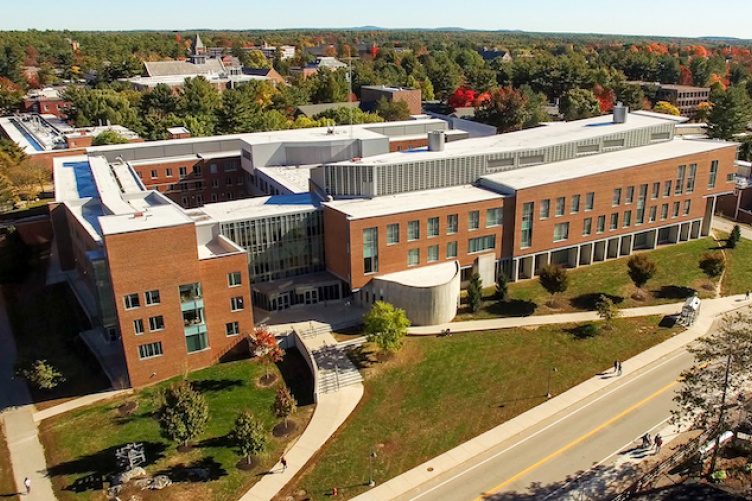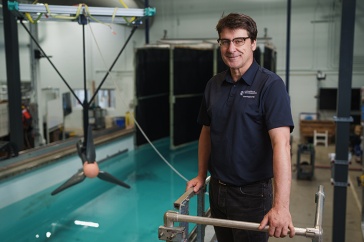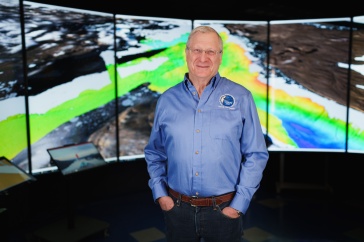
Photo by Scott Ripley
Two UNH faculty members have received National Science Foundation Faculty Early Career Development, or CAREER, awards. The grants of $500,000 are the NSF’s “most prestigious awards in support of early-career faculty who have the potential to serve as academic role models in research and education and to lead advances in the mission of their department or organization.”

Edward Song, Electrical and Computer Engineering
To better understand how neurodegenerative disorders like Alzheimer’s and Parkinson’s diseases develop, researchers need to study how neurons and immune cells in the brain communicate with each other. With the CAREER grant, assistant professor of electrical and computer engineering Edward Song hopes to be a part of that conversation, even though his background isn’t in medicine or neuroscience.
“I’m using my knowledge in engineering and technology to bring a solution to the neuroscience community,” says Song. “What I hope to achieve is to provide a new platform for measuring chemicals and proteins in the brain that allows medical researchers or neuroscientists to study the mechanisms by which these diseases develop and progress.”
Song is working to develop a biosensing platform that will measure the bi-directional communication between key neurotransmitters and protein biomarkers called cytokines, which are involved in inflammation and immune responses. “If successful, this technology will help elucidate the complex interplay between neurotransmission and neuroinflammation. It’s becoming increasingly important to study both signals at the same time,” he says. That knowledge, he adds, is a critical component in understanding the mechanisms by which cognitive disorders like Alzheimer’s progress at the molecular level.
An important step on the path toward a biosensor implementation will be developing a “lab-on-a-chip” system, which miniaturizes and automates the entire laboratory work done by human technicians onto a small chip that is the size of a few square centimeters. This innovation would not only enhance the performance in biosensing but would also reduce cost and processing time by eliminating human involvement and lowering the volume of chemical reagents needed. But “we are not quite there yet,” Song says. “It’s a lot more complicated than we initially thought.”
The lab-on-a-chip system that he is currently developing would measure neurotransmitters and cytokines directly from the neurons and immune cells from a single miniaturized device. The goal is to demonstrate the feasibility of the novel biosensing technology on a laboratory platform before moving the sensors to animal models and ultimately to clinical trials in humans.
The $500,000 award has educational implications as well as research ones: It will support one doctoral student working in Song’s lab, as well as outreach to budding scientists. Song already brings his research to K-12 students who participate in UNH’s Project SMART and KEEPERS science and engineering camps.
Song, who is also on the UNH Center of Integrated Biomedical and Bioengineering Research team, believes the prestigious CAREER award will fulfill its purpose of boosting his career development. “I can see myself investing a major portion of my early career towards working at the interface between engineering technology and biomedical research,” he says. “I’m very excited to be working on this, and I’m very fortunate to receive this grant.”

Laura Dietz, Computer Science
Millions of people utilize search engines every day to get answers to an array of questions, but the results don’t always reflect the comprehensive nature of the search inquiry.
Assistant professor of computer science Laura Dietz plans to address that shortcoming with the CAREER grant. The $500,000, five-year award for utilizing fine-grained knowledge annotations in text understanding and retrieval will support graduate students working on the project.
“I want to retire search engines as we know them and have something better,” says Dietz, who joined UNH’s department of computer science three years ago. “When searching on the internet for complex answers to a particular topic, the search results rarely give the breadth of information to best answer the underlying question.”
In simple terms, Dietz is looking to take the strengths of two of the most popular websites — Google and Wikipedia — and combine them to create a platform that would provide comprehensive and organized answers to complex questions. Dietz will use the dataset and quality measure to develop and test drive new solutions.
Currently, search engines such as Google populate links to websites by relying heavily on keywords but don’t always provide context. Meanwhile, Wikipedia organizes information in a way that provides context but cannot address all possible topics because it relies on much slower human editors to organize the information. Dietz hopes to train computers to give users access to information at a glance. Essentially, the software would produce a Wikipedia-like page for every single query it gets.
The findings of her research could impact anyone searching on the internet, including professional fact-checkers.
“We want to provide information at a level of complexity to help people form opinions,” says Dietz. “People are often seeing the same websites, and there is a lot of information that search engines are not displaying or is buried in the results.”
Currently, computers can read and respond to a query fast, but they may not truly understand the context of the query. The developed software would train computers to better understand queries and learn what is on-topic and what is off-topic in order to prevent users having to go through a potential long list of links to find what they are looking for.
The research is a continuing effort for Dietz, who has been coordinating an international shared task at the Text Retrieval Conference, TREC. A shared task is similar to a competition where the best research groups submit their best solutions, and as a community, they analyze what works best and why.
“I am excited, as it is an honor to receive a CAREER Award. It is vindication that I am working on good things and have good ideas,” says Dietz. “It is a nice thing to hear about your work.”
-
Written By:
Beth Potier | UNH Marketing | beth.potier@unh.edu | 2-1566 -
Written By:
Brooks Payette | College of Engineering and Physical Sciences
-
Compiled By:
Jody Record ’95 | Communications and Public Affairs | jody.record@unh.edu
















































